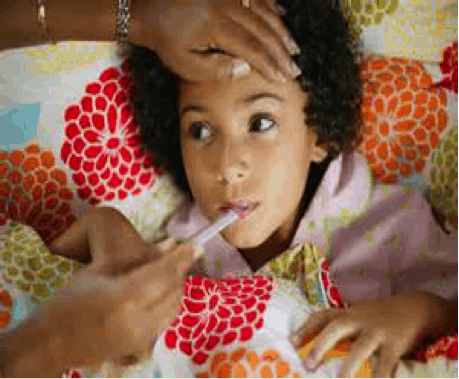Fever Remedies for Children
What is a fever in children?

Children often suffer from fevers when they are dressed too warmly or get overexerted during play. Other causes of fever may include viruses or infections that your child may have contracted while out and about in the world.
Measuring your child’s temperature is very important if you suspect that your child may be suffering from a fever. Use a digital thermometer to measure and record your child’s temperature, but avoid thermometers containing mercury because of their risk of poisoning to your child.
A body temperature of more than 100.4 degrees Fahrenheit is considered a fever. This is true of temperatures measured orally and rectally. Rectal temperature is usually only performed in infants. Older children can usually tolerate oral temperature measurement or having their temperature measured under their arm.
How can I treat my child’s fever at home?
Fever Remedies for Children: Over the counter
Fever in children usually responds well to home treatment and can often be resolved completely without medical intervention in some cases. Often treating your child’s fever may be as simple as removing excess clothing or giving them a cool bath. In other cases over the counter fever reducers may be beneficial to your child.
Choose children’s Tylenol, Motrin, or Advil for quick fever reduction and pain relief as well. Do remember to avoid aspirin in children and those under 20 to prevent Reye’s syndrome. Actually aspirin is not a very effective fever reducer in most cases even in adults.
Fever Remedies for Children: Natural Remedies
Of course if you’re not ready to reach for the medication or if you’d like to try some natural remedies in addition to these fever reducers then read on.
What are some natural fever remedies for children?
As mentioned above there are several natural remedies to give your child a great deal of relief from their feverish discomfort. Some are probably common remedies from your own childhood and many center on providing comfort as much as anything. Below are some quick tips to make your child cozy and cool when fever strikes:
· Keep blankets and clothing light to avoid an additional spike in an already rising temperature.
· Use cool, damp cloths on the forehead or neck to reduce the fever and provide comfort to your child.
· Bathe your child in lukewarm water to bring down a fever and prepare them for a good night’s sleep.
· Provide plenty of liquids including juice, electrolyte solutions, broth, soup etc… to prevent dehydration in your little one.
· Prevent shivering by keeping your child just comfortably warm to prevent an additional increase in their fever.
Fever Remedies for Children: When to seek medical attention
When should I seek medical treatment for my child?
Running a fever is a normal part of childhood and occurs most often in the winter months. Many children who attend school and daycare will be more prone to fever with infection or viral illness as well due to the close contact with other children. While getting the flu vaccination for you and your children is a great preventative measure along with good hand hygiene this may not be enough. If your little one is running a fever you may have some cause for concern or need for medical treatment if:
· Your child’s fever is 102 degrees or higher
· Your child’s fever has lasted for more than two days
· Your child’s fever is accompanied by lethargy, stiff neck, severe throat, rash, diarrhea, or vomiting.
· Your child has shaking chills
· Your child is producing few wet diapers or has not been using the toilet very often
· Your child has sunken eyes or an extremely dry mouth
· Your child has inconsolable crying
· Fever in children under 2 months of age is always an emergency if the temperature is above 100.4 degrees.
· Convulsions or seizures occur
If any of these signs or symptoms are present please seek medical treatment for your little one with either your doctor or in an emergency department.